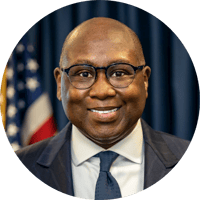Leaders in Lending | Ep. 115
A Former NCUA Chairman’s Perspective on Innovation
Rodney Hood, Eleventh Chairman and current Board Member of the National Credit Union Administration, shares how fintech partnerships and regulator collaboration can enable credit unions to tackle financial equality and literacy.


GUEST SPEAKER
Rodney Hood
President Donald J. Trump nominated Rodney E. Hood for the NCUA Board on January 19, 2019. The U.S. Senate confirmed him on March 14, 2019, and he was sworn in as the eleventh NCUA Chairman on April 8, 2019. Mr. Hood served as the NCUA’s Chairman until January 25, 2021. As a Board Member, Mr. Hood serves as the NCUA’s representative on the Board of Directors of NeighborWorks America, one of the nation’s leading affordable housing and community development organizations. This is his second time serving as the agency’s representative on the board of NeighborWorks. Mr. Hood was previously nominated to the NCUA Board by former President George W. Bush and served from November 2005 until August 2009. During his first term on the Board, he was appointed Vice Chairman. Immediately prior to rejoining the NCUA Board in 2019, Mr. Hood served as a corporate responsibility manager for JPMorgan Chase, managing national partnerships with non-profit organizations, financial regulators, and community stakeholders to promote financial inclusion and shared prosperity in underserved communities throughout the United States.

ABOUT
NCUA
Created by the U.S. Congress in 1970, the National Credit Union Administration is an independent federal agency that insures deposits at federally insured credit unions, protects the members who own credit unions, and charters and regulates federal credit unions. A three-member Board of Directors oversees the NCUA’s operations by setting policy, approving budgets and adopting rules. Each Board Member is appointed by the president and confirmed by the Senate. The president also designates the Chairman of the NCUA Board. No more than two Board members can be from the same political party, and each member serves a staggered six-year term. The NCUA protects the safety and soundness of the credit union system by identifying, monitoring and reducing risks to the National Credit Union Share Insurance Fund. Backed by the full faith and credit of the United States, the Share Insurance Fund provides up to $250,000 of federal share insurance to millions of account holders in all federal credit unions and the overwhelming majority of state-chartered credit unions. The NCUA also plays a role in helping to ensure broader financial stability as a member of the Federal Financial Institutions Examination Council. This council is responsible for developing uniform principles, standards and report forms, and for promoting uniformity in the supervision of depository financial institutions. The NCUA’s Chairman is also a voting member of the Financial Stability Oversight Council, an interagency body tasked with identifying and responding to emerging risks and threats to the financial system.
Key Topics Covered
- Financial Equality: A Civil Rights Issue
- Fintech partnerships: Resource Redistribution
- Investing in the Future

"When you hear me, as the former Chairman of our agency, being so arduous in my pursuit of fintech, it's not chasing the toy. It's making sure that credit unions have the tools to remain vibrant and sustainable in today's environment."


"I'm thinking that [in the future], digital currency and digital assets are going to be far more commonplace than they are today."
EPISODE RECAP & SUMMARY
Credit scores determine where people live, where their kids go to school, what they drive and even where they work. Couple that with the fact that nearly half of minority households can not cover an emergency $400 expense.
Rodney Hood, Eleventh Chairman and current Board Member of the National Credit Union Administration, made financial equality his mission. Fintech partnerships enable credit unions to extend credit access and provide financial literacy education services, ultimately creating a more prosperous future.
Join us as we discuss:
- Financial Equality: A Civil Rights Issue
- Fintech Partnerships: Resource Redistribution
- Investing in the Future
Financial Equality: A Civil Rights Issue
Government regulators are only one step in achieving more financial equality for marginalized communities. They need the support of social entrepreneurs to leverage the game-changing products that help communities thrive.
The competitive environments — often known as “shark tanks” — that entrepreneurs operate in have increased flexibility for forward motion that government officials lack, particularly in the realm of social justice. There has been an acute lack of impactful innovation around solving financial equality in recent years.
That’s where Hood comes in. “It's the civil rights issue of our generation,” Hood said. “So I batted this idea around with them — a competition where social entrepreneurs, fintechs focusing on financial inclusion, can get together and do a shark-tank-like event where we get people together, where we judge and give them our opinions. It was a wonderful way to get a lot of interest and excitement.”
Alongside the success of the pitch event, the head of Hood's newly launched innovation office is working with the broader VC Community, fintechs, and credit unions to develop more consistent financial inclusion events.
Fintech Partnerships: Resource Redistribution
Hood is not only an insurer but also a policymaker. That means that he regulates around 4,800 credit unions serving 135 million members of those institutions. About a third of the American public has a credit union account, with approximately $2.2 trillion in assets. Credit unions not only have substantial assets, but they have 1.5 trillion in outstanding loans.
As a regulator, Hood paves the way for consumer protection and compliance for credit unions. During his 20+ years in financial services, he has had his hands on almost every factor of finance, from affordable housing to fintech.
“I'm such a proponent of fintech because not everyone is going into the traditional brick and mortar branches of yesteryear to conduct business,” he said. “When I talk about embracing technology and fintech, it's not doing it because it's a luxury. Pre-COVID, we all probably thought of fintech products as cute little toys — no. It has gone immediately from a cute little toy to a strategic imperative.”
By marrying credit union loan volumes and reach with fintech innovations, there could be sizable strides to keeping credit unions vibrant and sustainable for the betterment of those 135 million members and beyond.
“These are all tools that today's generation wants. If they don't see them, they're going to walk,” Hood said. “If we don't embrace it, then we'll not even have an industry to regulate a few years from now.”
Investing in the Future
Hood has consistently made serving the underserved the core of his career — from serving as a missionary in Zimbabwe to championing affordable housing. Throughout his career, he’s seen the sizable impact credit has on one's life trajectory, and how making small-dollar loans available can elevate someone’s path.
“I wrote an op-ed where I call for individuals and credit unions and banks to work together. The op-ed was nice, but we needed something more demonstrable than that,” he said. “So, I worked with my senior leaders here and created the ACCESS Initiative. That stands for Advancing Communities through Credit, Education, Stability, and Support.”
The ACCESS Initiative means that there will be a dedicated person helping credit unions learn about financial education, distribute financial education to their members, enable financial coaching and more.
Community advancement on the horizon
Through financial literacy efforts, Hood hopes to abolish young folks saddling themselves with mountains of debt from that “free” credit card they signed up for because it came with a free t-shirt.
“I'm excited that financial literacy and financial capability are really, really being taught, and a lot of districts around the country are making that a requirement. That’s so important,” he said. “I'm also excited that I'm starting to see an emergence in credit unions of high school credit unions, that means that credit unions are taking some of their resources and putting a branch in a high school.”
According to Hood, credit unions are stepping up in their communities to support a financially literate future, helping create generations built on the foundation of transparent finances and equitable opportunity.
Stay tuned for new episodes every week on the Leaders in Lending Podcast.





